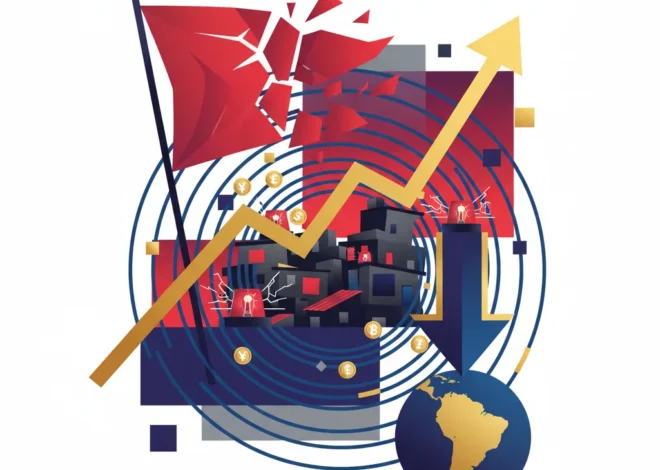
Mali on the Brink: Why a Sahel Crisis Is a Red Flag for the Global Economy
In the heart of West Africa, a crisis is unfolding with profound implications that stretch far beyond its borders, reaching into the boardrooms of international corporations and the trading floors of global financial centers. Mali, a nation once seen as a key Western partner in the fight against extremism, is now facing a dire reality: its capital, Bamako, is being slowly encircled by al-Qaeda-linked jihadists. As the military junta in power loses its grip, the situation is rapidly deteriorating from a counter-terrorism challenge into a full-blown state collapse—a scenario that investors, business leaders, and financial professionals cannot afford to ignore.
The advance of the Jama’at Nusrat al-Islam wal-Muslimin (JNIM), an al-Qaeda affiliate, represents a strategic nightmare for regional and international security. But for the world of finance and investing, it signals a new and dangerous phase of geopolitical risk. The potential fall of a nation of 22 million people threatens to destabilize an entire region, disrupt critical supply chains, and create a governance vacuum that could have repercussions for the global economy for years to come. This isn’t just a distant conflict; it’s a critical test of the resilience of emerging markets and a stark reminder of how quickly political instability can erase economic progress.
From Partner to Pariah: The Unraveling of Mali
To understand the current crisis, one must look back at the chain of events that led Mali to this precipice. A decade ago, a French-led military intervention successfully ousted jihadists who had seized control of the northern part of the country. For years, a combination of French troops and a 15,000-strong UN peacekeeping force maintained a fragile stability. However, this international presence became increasingly unpopular, fueling nationalist sentiment that culminated in two military coups in 2020 and 2021.
The new military junta, led by Colonel Assimi Goïta, took a sharp turn in foreign policy. It expelled the French ambassador, forced the withdrawal of French and UN forces, and instead invited mercenaries from Russia’s Wagner group. This pivot was framed as a reclamation of sovereignty, but the results have been catastrophic. According to one western diplomat cited by the Financial Times, the junta has “lost control of the situation.” The Wagner forces, focused more on protecting the regime and securing economic assets like gold mines, have proven ineffective at halting the jihadist advance. In fact, their brutal tactics have often alienated local populations, pushing them towards the insurgents.
The strategy of JNIM has been chillingly effective. Instead of a direct assault on the capital, they have opted for a “strategy of suffocation,” cutting off major roads and imposing a blockade on Bamako. This has led to soaring food prices and a growing sense of panic within the city, a reality confirmed by residents and analysts on the ground (source). The state’s authority is crumbling, with vast swathes of the country now effectively under jihadi control.
Beyond the Polls: Why Labour's Economic Silence is a Ticking Clock for UK Investors
The Economic Domino Effect of State Collapse
For investors and financial analysts, the security situation is a proxy for a much broader economic collapse with significant regional and global implications. Mali’s crisis is a case study in how geopolitical events directly impact everything from commodity prices to the stability of regional banking systems.
1. Disruption to Key Global Supply Chains
Mali is one of Africa’s largest gold producers. The mining sector has long been a primary driver of its economy and a major source of foreign direct investment. With the junta’s authority waning and Wagner mercenaries reportedly focused on securing these assets for their own benefit, the formal mining industry is under extreme threat. Any disruption to Mali’s gold output could have a ripple effect on the global stock market, particularly for mining stocks, and influence the price of this crucial safe-haven asset. Furthermore, Mali is a significant cotton producer. The inability to safely harvest and transport these commodities will cripple the country’s export revenues and impact global textile supply chains.
2. Regional Economic Contagion
Mali is a member of the West African Economic and Monetary Union (WAEMU), an eight-country bloc that shares a common currency, the CFA franc, which is pegged to the Euro. The collapse of a member state of this size poses a systemic risk to the entire union. It could trigger a crisis of confidence in the regional banking sector, leading to capital flight from neighboring countries like Senegal and Ivory Coast—nations that are far more integrated into the global financial system. The stability of the CFA franc itself could be called into question, creating a macroeconomic shockwave across West Africa. The potential for a refugee crisis would also place an immense economic burden on its neighbors, diverting resources from development to humanitarian aid.
3. The Rise of Illicit Economies and Financial Risks
Where the formal state recedes, an informal and often illicit economy thrives. A collapsed Malian state would become a hub for smuggling, trafficking, and terrorist financing. This creates a challenging environment for global efforts to combat money laundering and terror financing (AML/CFT). The lack of regulatory oversight could see a surge in the use of unregulated channels for moving money. While advanced financial technology offers solutions for transparency, in a lawless state, unregulated fintech and even blockchain-based assets can be co-opted for illicit purposes, posing a new set of challenges for global financial regulators. International banks and trading firms will have to apply extreme due diligence when dealing with any transactions originating from the region.
A Nation’s Vital Signs: A Snapshot of the Crisis
The following table provides a clear overview of the deteriorating situation in Mali, highlighting key metrics that are critical for understanding the scope of the crisis. These data points illustrate the direct link between security and economic stability.
| Indicator | Status / Trend | Implication for Investors & Business |
|---|---|---|
| Territorial Control | Government controls less than half the country, with major transport routes contested. | Severe supply chain disruption; physical assets at risk; inability to conduct business safely. |
| Internally Displaced Persons (IDPs) | Over 400,000 and rising (source). | Humanitarian crisis, social instability, increased pressure on urban resources and state finances. |
| Foreign Direct Investment (FDI) | Sharply declining due to political instability and security risks. | High political risk premium; existing investments may become stranded assets; new investment is effectively frozen. |
| Food Security | Blockades are causing food prices to spike, threatening famine-like conditions. | Risk of civil unrest and total breakdown of social order; collapse of local consumer markets. |
| Key Exports (Gold, Cotton) | Production and transport are severely threatened by insecurity. | Volatility in global commodity markets; revenue loss for the state, further weakening it. |
From Red Ink to AI: Decoding the Tony Blair Institute's High-Stakes Strategic Overhaul
Why This Matters for Global Markets and Geopolitics
It is tempting for a finance professional in a major world capital to dismiss the events in Mali as a remote, localized conflict. This would be a grave miscalculation. The implications are global and multifaceted.
First, the fall of Mali would hand a monumental victory to al-Qaeda, giving it a de facto state in the heart of Africa. This would create a supercharged terrorist haven for planning attacks against Western targets and further destabilizing the continent. The economics of counter-terrorism would shift dramatically, requiring far greater international resources to contain the threat.
Second, it represents a significant geopolitical win for Russia, which has successfully used the Wagner group to displace Western influence in yet another African nation. This pattern, also seen in the Central African Republic and Burkina Faso, redraws the strategic map of Africa. It creates uncertainty for international corporations and complicates diplomatic and trading relationships for Western governments.
Finally, the ensuing humanitarian catastrophe would trigger massive migration flows, primarily towards North Africa and Europe. The political and economic costs of managing such a crisis would be immense, impacting European budgets and politics for a decade or more.
The Crown's Balance Sheet: Devaluing a Monarchy Through Reputational Risk
Conclusion: An Unignorable Risk
The slow-motion collapse of Mali is more than a security failure; it is an impending economic and humanitarian disaster with first-order impacts on the global financial system. For investors, it is a brutal reminder that in our interconnected world, political risk in one corner can trigger market volatility elsewhere. The stability of supply chains, the viability of emerging market investments, and the security of the international banking system are all intertwined with the events unfolding around Bamako.
Monitoring the situation in the Sahel is no longer just the job of diplomats and generals. It is an essential task for anyone involved in international finance, investing, and business. The crisis in Mali is a flashing red light on the global dashboard, and ignoring it is a risk that no prudent professional can afford to take.


